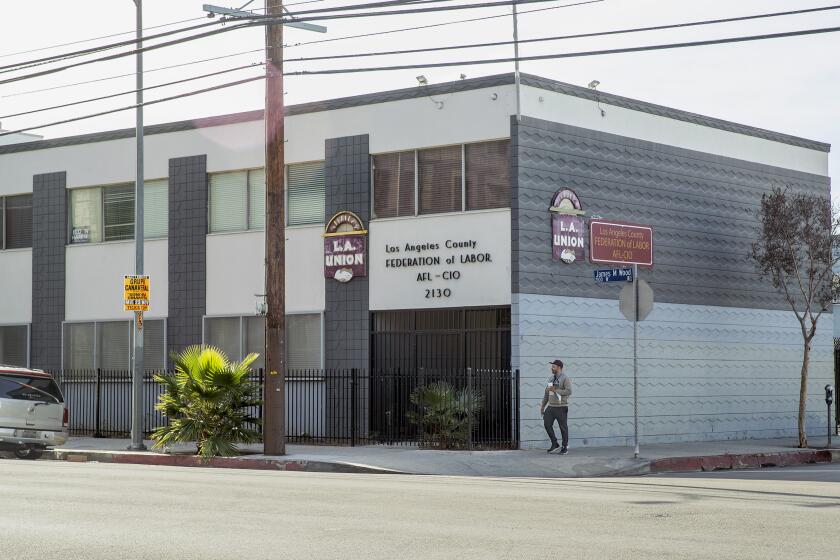Secession Worries Tenants, Owners
The November vote on San Fernando Valley and Hollywood secession could toss rent control and other Los Angeles housing laws up for grabs, causing anxieties among tenants and landlords alike.
Tenants fear the real estate connections of several Valley secession leaders portend a quick death for rent control if the region breaks off from the city. But apartment owners citywide have their own worries: Some believe secession would increase the political clout of renters in the remainder of Los Angeles.
In a bid to assure voters that secession would not bring rising rents and evictions, backers of a municipal breakup are asking every council and mayoral candidate on the secession ballot to sign a pledge to adopt rent controls in a Valley or Hollywood city.
“We are working to put people at ease,” said Jeff Brain, president of Valley VOTE. “The Valley city will support the continuation of the existing rent control.”
The Hollywood pledge goes a step further, asking candidates to agree to extend rent control to more tenants, said Gene La Pietra, who heads Hollywood VOTE. Such an expansion, however, might not be allowable under state law.
In any case, the state attorney general’s office has said that the promises could not be legally enforced. Secession opponents say that opinion underscores the threat that a breakup poses to hard-won protections for tenants.
“Secession could very well mean the end to rent control [for] Valley tenants and Hollywood tenants,” said Larry Gross, a longtime tenant activist and executive director of the Coalition for Economic Survival.
Six in 10 Los Angeles residents are tenants--the nation’s second-highest percentage after New York City--so rent control and other housing issues could be key factors at the polls. The secession movements come at a time when rents have reached historic highs and affordable housing is in short supply.
Los Angeles is one of a small number of cities that still have some form of rent control. There are 480,151 registered units under rent control in the city. About 25% of those (or 118,588) are in the Valley, and 6% (32,797) are in Hollywood.
The law limits rent increases on most units built before October 1978. It also protects tenants from arbitrary evictions.
The secession measures require a Valley or Hollywood city to adopt Los Angeles ordinances for 120 days. After that transition, elected officials of the new cities would be free to change the laws.
In Hollywood, where an estimated 72% of residents are tenants, La Pietra said that council candidates cannot ignore renters. “Anyone that is not committed to this program and this pledge, I can guarantee you will not be elected,” he said.
A little more than half of the voters in Hollywood are registered at apartment addresses, compared with a quarter in the proposed Valley city and nearly 27% citywide, according to the Greensburgh Group, a Costa Mesa-based firm that maintains statewide voter registration figures.
La Pietra, who said he is a long-time supporter of rent control, wants to strengthen the law so that it also would cover 25% of new apartment developments.
Under the current law, most rent increases are capped at 3% a year. When a tenant moves, the rent can be raised as much as the landlord wants, but the unit falls under rent control again, once it is leased. Under La Pietra’s plan, a unit would have to be vacated three times before the rent could be raised without controls. La Pietra said that would prevent landlords from using loopholes in the law to evict tenants and raise rents.
But La Pietra’s proposal conflicts with the state’s 1996 Costa-Hawkins law, which ended stricter rent controls. The law also restricted any expansion of rent control to new units or to those that were already exempt when the law was passed, said Christine Minnehan, legislative advocate for the Western Center on Law and Poverty.
Meanwhile, tenant advocates have questioned the Valley secessionists’ claims of support for rent control because of the movement’s strong support from landlords and other real estate interests.
Brain is a real estate broker. Valley VOTE’s chairman, Richard Close, is a real estate attorney who fought in the 1970s against rent control as a member of a group called Coalition for Housing.
While in the state Legislature, Richard Katz, who heads the Valley secession campaign, voted so often against bills related to rent control and other tenant protections that a coalition of 30 renters groups gave him an F on a “Renters Rights Report Card,” Gross said.
But Katz has said he supports rent control as it “is on the books” in Los Angeles.
Gross’ group gave Brain an F as well, calling him “the Realtor’s candidate” during his 1995 run for City Council.
“Politically, everyone will say they support rent control,” said Gross, whose organization fought for rent control in Los Angeles in the 1970s and later in West Hollywood. “It’s when you get down to the details ... the provisions of rent control, then you can see whether a person really supports it.”
Beyond the rent control debate, secession backers say new cities in the Valley and Hollywood would be better equipped to address housing problems and to do a better job of administering programs such as code enforcement.
“The bottom line is that a new Valley city will be able to get its own money and set up its own program, tailored to the needs of the poor and impoverished in the Valley,” Brain said.
Social service providers in the Valley have long complained that they do not get their fair share of federal grants, that the money flows to other areas of the city.
But in their arguments against a breakup, city officials and housing advocates point to the creation earlier this year of a historic $100-million trust fund for affordable housing as a sign that things are improving.
“In Los Angeles, we’ve never seen as strong a commitment to housing as we have now,” said Los Angeles City Councilman Eric Garcetti, vice chairman of the city’s Housing and Community Development Committee.
In the Valley, numerous homeowner associations support secession. Landlords’ support is mixed. Some embrace secession, but others citywide have said that a breakup would remove so many single-family homes from Los Angeles that renters would gain influence with the Los Angeles City Council.
The Apartment Assn. of Greater Los Angeles has not yet taken a position on secession. The Apartment Owners Assn. of Southern California opposes the breakup efforts.
“We need the community to stand together to provide the affordable housing that’s needed,” said Laurie Nagy, executive director of the Apartment Owners Assn. of Southern California. State law requires that every city and county submit a plan for providing affordable housing. A new Valley or Hollywood city would be required to submit such a plan.
If people vote for secession on the basis of “the idea that low-income people are eating up a lot of the city services, they’re going to be eating up a lot more in a Valley city,” said Rod Field, of the Los Angeles Housing Law Center. “They’re going to have to build some low-income housing right away.”
Secession backers say the breakup campaign will provide a forum for housing issues. “People running for mayor and council will articulate their views on housing, just like every other issue,” Katz said.
Mayor James K. Hahn, who is leading the anti-secession effort, has already highlighted housing in his attacks on the cityhood proposals.
“The key is whether there is going to be the same level of commitment to housing as there is in Los Angeles,” Hahn said. “Would these new cities make the same commitment out of their budgets? Where would they find the money to do it?”
Speaking in a packed church in Hollywood in June, Hahn and Garcetti promised to build 500 units of affordable housing there over the next three years.
“There’s no denying that a new city of Hollywood would not be able to do this--at least not for three to five years,” said Bob Untiedt, executive director of the Hollywood Interfaith Sponsoring Committee, which organized the event.
The group’s members labeled housing their top concern.
Hollywood secession leaders accused the mayor of making promises he cannot keep.
Thelma Baker, who lives in a mobile home in Pacoima with her adult children, has yet to decide how she will vote on secession. But housing issues concern her.
“I don’t know enough about what they plan to do if they split with Los Angeles,” said Baker. “Right now I live with my kids, [but] who knows? There might be a time when I have to go into an apartment.”
*
(BEGIN TEXT OF INFOBOX)
*
Housing Comparison
How participation in Los Angeles Housing Department programs compares in the San Fernando Valley and Hollywood to the rest of Los Angeles.
*
Systematic Code Enforcement Program
Multifamily rental buildings with two or more occupied units are inspected once every 5 years to ensure that the units are safe and habitable.
July 2000 to June 13, 2002
Hollywood 9%
San Fernando Valley 33%
Rest of city 58%
*
Major projects
Financing program for low and moderate income housing development, new construction or major rehabilitation.
1999 to 2000 to June 2002
Hollywood 3%
San Fernando Valley 28%
Rest of city 69%
*
Neighborhood Preservation
Low interest home improvement rehabilitation loans to single-family homeowners with incomes at or below 80% of the county median income.
1999-2000 to 2002
Hollywood 0.2%
San Fernando Valley 20%
Rest of city 79.8%
*
Handyworker Program
Provides free home repairs to low or moderate income homeowners who are 62 years of age or older or physically disabled. Emergency repairs that directly affect the health and safety of occupants are also provided to low or moderate income homeowners regardless of age or disability status.
April 1, 1998 to June 2002
Hollywood 2%
San Fernando Valley 24%
Rest of city 74%
*
Mortgage Revenue Bond Program
Provides below market mortgage interest rates and purchase assistance to qualified first time home buyers.
1999-2000 to June 10, 2002
Hollywood 0.2%
San Fernando Valley 36%
Rest of city 63.8%
*
Source: L.A. Housing Department
More to Read
Get the L.A. Times Politics newsletter
Deeply reported insights into legislation, politics and policy from Sacramento, Washington and beyond. In your inbox three times per week.
You may occasionally receive promotional content from the Los Angeles Times.






